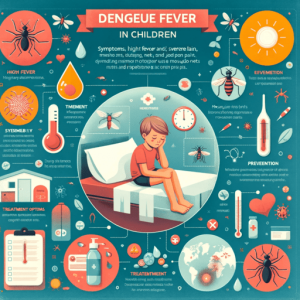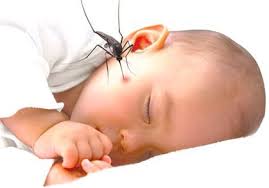Dengue Fever in Children: Comprehensive Guide to Symptoms, Treatment, and Prevention
Dengue fever in children, caused by the Aedes mosquito, poses a significant health concern, particularly in this age group. This mosquito-borne tropical disease affects individuals of all ages, but can have more severe implications for children.
Symptoms of Dengue Fever in Children
The primary symptom of dengue in children is a high-grade fever. This fever is often accompanied by several other symptoms, which can significantly impact a child’s health. These include:
- Severe aches and pains throughout the body
- Intense headaches, often described as debilitating
- Pain around the eyes or in the orbits
- A distinctive skin rash, which can appear across different parts of the body
Children with dengue fever may also experience “bone-breaking” pain, especially in their joints and muscles. This intense pain is a distinguishing feature of dengue in children, setting it apart from other febrile illnesses.

Severity and Types of Dengue Fever in Children
Dengue fever in children can vary in severity. While most children experience simple dengue fever, constituting about 90% of cases, 5-10% of cases can escalate to dengue hemorrhagic fever – a more severe form that can lead to complications like bleeding and shock. Early identification and management of these severe cases are crucial to prevent life-threatening consequences.
Diagnosis and Laboratory Findings in Dengue Fever in Children
Diagnosing dengue fever in children often involves a Complete Blood Count (CBC). Typically, around the third day of illness, the CBC may show a decreased platelet count and a lowered total leukocyte count (TLC). These findings are vital for monitoring the disease’s progression and determining its severity.
Recovery and Management of Dengue Fever in Children
The recovery period for dengue fever in children usually spans 2-7 days. During this time, monitoring the child’s platelet count and TLC is crucial, as sudden changes can signify a shift to more severe forms of the disease. Parents and caregivers are advised to ensure that the child remains well-hydrated by encouraging the intake of fluids and juices. It’s important to avoid colored soft drinks, which might not be beneficial during the recovery process. In some instances, administering intravenous fluids becomes necessary, especially if the child is unable to maintain adequate oral intake.
Complete rest is essential during the recovery phase of dengue fever in children. Certain medications, like Brufen (Ibuprofen) and Aspirin, should be avoided due to their potential to increase bleeding risks, a concern particularly in cases of dengue hemorrhagic fever.
- Prevention of Dengue in Children
- Preventing dengue fever in children primarily involves avoiding mosquito bites. This can be achieved through various measures:
- Use of mosquito nets while sleeping
- Applying mosquito repellents on exposed skin
- Wearing full clothing to cover as much skin as possible, especially during the rainy season when mosquito activity is high
- Consulting a Healthcare Professional for Dengue Fever in Children
If a child exhibits fever without any obvious cause, consulting a pediatrician is crucial. Early medical intervention can significantly impact the management of dengue fever in children and prevent complications. A healthcare professional can provide tailored treatment and advice based on the child’s specific symptoms and overall health condition.
Conclusion
Dengue fever in children is a significant health concern that requires prompt attention and appropriate management. Understanding the symptoms, the importance of early diagnosis, and effective treatment and prevention strategies are key to ensuring the health and well-being of children at risk of this disease. Parents and caregivers play a vital role in monitoring the health of their children, ensuring they receive the necessary care, and taking preventive measures to protect them from mosquito bites.
For Consultaion with Pediatircian Click Here

